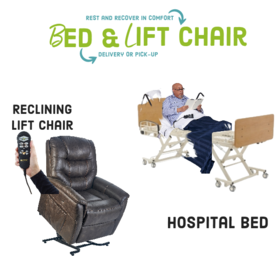Blog 6 Ways to Heal Faster After an injury or a Surgery the easy way

You probably have a lot of questions if your doctor has suggested surgery. You probably want to know as much as possible about the procedure, and you're also ready to return to your normal life as soon as possible.
Time spent healing depends on factors like the nature of the surgery and the severity of your condition or damage. Learn as much as possible about the surgery and your home recovery options.
Pay strict attention to your doctor's instructions before and during surgery. These tips for a speedier recovery can also be tried at home. If you can maintain a patient and positive attitude, your strength levels will rise steadily over time.
It will be business as usual before you even realize anything has changed. Before undergoing any form of surgery, you should be prepared to ask the following questions of your surgeon and the other members of the medical team:
Is there anything that might go wrong? Where can I find the pain medication that you need? Is it likely that you'll need in-home medical attention during your recovery? How soon before you feel ready to return to work and regular life?
The length of time it takes to heal after surgery depends on several factors, including the nature of the procedure and the severity of your current disease or injury. Learn as much as possible about the operation and what you can do to help yourself recover more quickly at home. Follow them carefully if your doctor gives you specific instructions before and after surgery.
If you can maintain a patient and positive attitude, your strength levels will rise steadily over time. You won't even realize how quickly time has passed until you're back to your regular schedule.
1. Give your body proper healing energy after surgery.
It's important to ensure your body gets the nourishment and energy it needs to heal fully, even if you don't feel like eating right after surgery. Protein is essential for healing, so eat plenty of eggs, chicken, and other protein-rich foods.
Vitamin C, found in fruits, has been shown to boost the body's rate at which it repairs itself after an injury or illness. Iron in foods like fish and eggs and vitamin B12, found in animal products, work together to help the body make new blood cells when needed.
Fiber and probiotics help the immune system do its job, which is to fight off infections. Eating yogurt and granola can quickly and easily consume fiber and probiotics. Avoid sugary meals because they disrupt your body's natural balance and weaken your immune system.
Another reason to stay away from sports beverages high in sodium is that salt makes the body hold onto water, which can lead to puffiness.
2. Activate Your Body and Start Moving!
As soon as you can, stand up and start moving around. Blood flow is aided by movement, which aids in the healing process. The likelihood of life-threatening blood clots can be reduced by walking, too.
Light exercise can reduce the likelihood of contracting pneumonia. If your doctor gives you the go-ahead, it's time to start therapy to break up the scar tissue and retrain your muscles.
3. Follow Instructions
Do not alter your course of therapy without first consulting with your doctor. Even if you don't think you need them, it's important to keep taking your medications exactly as recommended. Don't get behind the wheel, don't lift, and don't do anything that limits your range of motion.
Your wound may look fine outside, but it may need additional internal healing before you can safely participate in some activities. Maintain regular checkups with your doctor, and be sure to voice any concerns you may have.
To get the best results from surgery, working closely with your surgeon and sharing information honestly is vital.
4. Follow Your Healthcare Provider's Instructions
You will be reminded of this fact repeatedly, and it will not go unnoticed. On the other hand, doctors have learned much from post-op patients who take only the advice they find useful and disregard the rest.
This is not the right response because every directive has a goal. Adhering to the rules, such as the one that says you can't take a bath, go swimming, or lift anything that weighs more than 10 pounds for the first few weeks after surgery, might be inconvenient. Instead of directly disputing your doctor's orders, you could call and ask for an explanation.
5. Prevent Infection
If your operation goes well, you must take every precaution to prevent infection. One of the simplest and most crucial things you can do for yourself during recovery is always wash your hands before touching your incision. Infection can be avoided in this way.
Surgical site infections are extremely unusual and usually present within the first 30 days after surgery. However, it would be best if you still talked![]() to your doctor about keeping your skin in good condition to resist infections.
to your doctor about keeping your skin in good condition to resist infections.
6. Control Your Pain
Maintaining some measure of pain relief after surgery is mandatory. Some patients oppose the idea because they worry about becoming reliant on the medicine, view medication use as a sign of weakness, or don't like how they feel when they take pharmaceuticals.
Think of it this way if it rings true for you: If you are in too much pain to cough, you increase your chances of acquiring pneumonia. If the pain is so bad that you can't move, you increase your chances of getting blood clots and pneumonia.
To promote healthy recovery, managing the pain is important (complete pain relief may be unrealistic).
Summary
Adhering to the post-op instructions issued by your healthcare practitioner and attending all of your planned follow-up medical appointments is crucial to your recovery after surgery. Taking care of your wound, replenishing your strength with food and fluids, and managing your pain are crucial steps after surgery.
Tags
- contest
- event
- supplies
- design
- brand
- video
- Compression
- upright walker
- four wheel walker
- rollator
- wheelchair
- Ostomy
- elegantly
- elegantly
- accessibility
- Mobility
- knee walker rental
- knee scooter sales
- knee scooter
- post operative shoe
- anti-embolic stockings
- pain management
- cryotherapy therapy
- hot cold compress
- compression stockings
- lift chair
- wound Care
- air purifier
- fall prevention
- cushion
- oxygen therapy
- cpap, bipap
- Hospital Bed
- Life Aide
- EMS
- recovery
- splint
- knee brace
- Bathroom
- patient lift
- medical supply
- Wound dressings
- Lightweight Wheelchair
- hospital beds for sale
- sky medical supplies rentals
- compression socks
- Adult Diapers
- Rollator Walker
- Bed Wedge Pillow
- Hospital beds
- Patient Lifts and Slings
- Portable Oxygen Concentrator
- Patient Lift Slings
- knee scooter rental
- folding mobility scooter
- mobility scooter
- medical shoes
- raised toilet seat
- hospital beds for rent
- lift chair recliner
- chair lift
- electric wheelchair
- Power Lift Recliners for Elderly
- Senior Walkers
- Bedside Commodes
- whill wheelchair
- compression hose
- Whill Electric Wheelchairs
- Bariatric Wheelchair
- Recliner Chairs with Lift
- Colostomy Bag
- Crutches
- Medical Wedge Pillow
- skin barrier tape
- Post Surgery Ice Machine
- Bedside Commode
- chair lift recliners
- cane holder scooter
- lift chair prices
- drop arm commode
- rollator walker with ergonomic seats
- Hospital Bed Rental
- Wheelchair Tray
- Golden Technologies Lift Chair
- Nova GetGo Junior Rollator
- power lift recliners
- Knee Scooters and Crutches:
- stand up walker for seniors
- stand up walker as seen on TV
- Women's Walking Canes
- Knee Immobilizers
- Bed Wedge Pillow
- Medical Supply Stores
- Sit to Stand Lifts
- Grab Bars
- Compression Gloves
- incontinence bed pads
- Lift Reclining Chair
- Knee Walker Scooters
- Hernia Belt Near You
- Mobility Scooter Stores Near Me
- Folding Knee Walker
- Oxygen Concentrator Store
- Inogen Battery
- Electric Bed Frames
- Placing Lift Chair
- diaper brief
Related Posts
Get weekly articles in your inbox on the latest medical supply news, exclusive deals, and helpful health tips.






